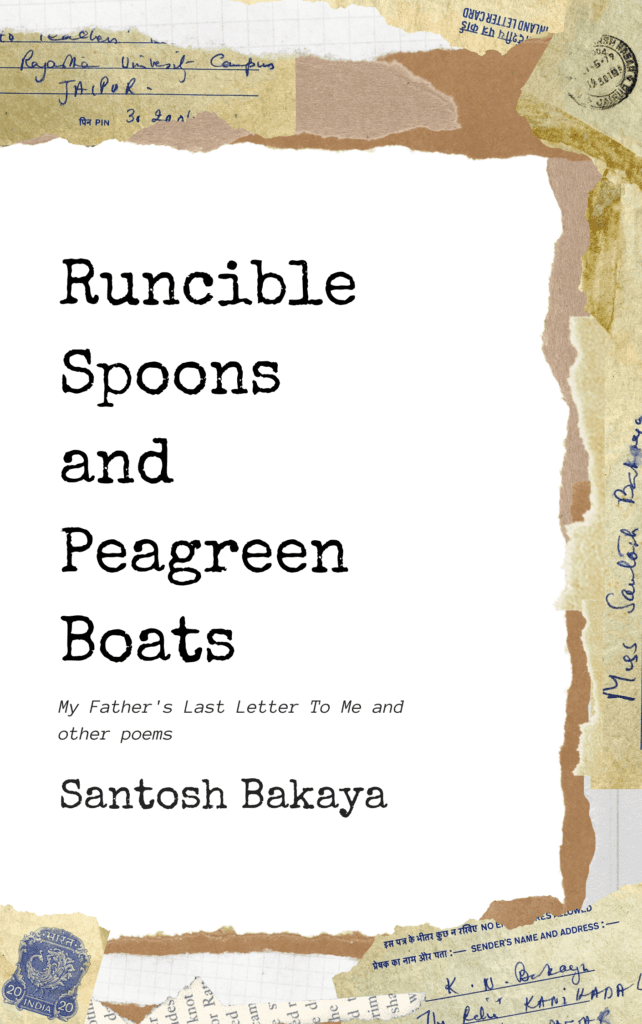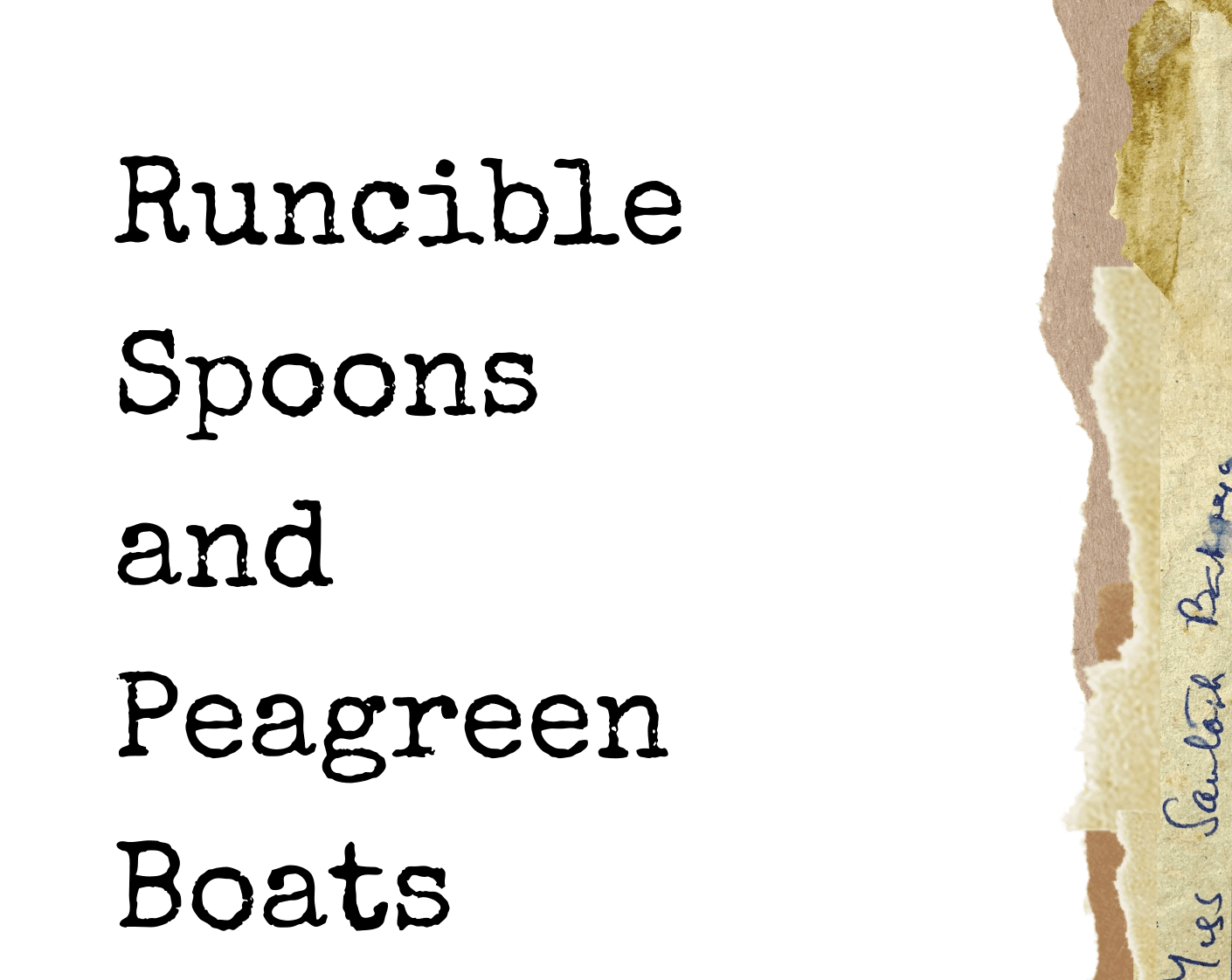Dr. Sutanuka reviews Santosh Bakaya’s book of poems, Runcible Spoons and Peagreen Boats: My Father’s Last Letter to Me and Other Poems. An exclusive for Different Truths.

As one remembers one narrates when one re-remembers one still narrates, and narration is essentially creating meaning. Memories are who we are — the essential particles of individuality. Runcible Spoons and Peagreen Boats is a type of cultural memory; a conscious thing whose neurons are words and whose synapses are what poet Santosh Bakaya does with those words. Runcible Spoons and Peagreen Boats focus on memory or series of memories from the poet’s past. The memory is noteworthy because it was especially vivid, incited strong emotion, and taught the poet a life lesson.
The book has a neat structure and is divided into four sections, Footfalls, Granny, Dad, Mummy, and an Epilogue: The Pleasing Serenades. In the Introduction to the book, Ampat Koshy writes, “this makes it structurally about loved ones, but it is also about her siblings and dog and Kashmir and Jaipur, as well as the house Relic, an unbought car, a cycle and so many other things, replete with regrets, griefs, joys, little sorrows and pranks and everything else that could drench it in lachrymose, saccharine, sweet sentimentality and nostalgia and drown it”.
The title of the book Runcible Spoons and Peagreen Boats is taken from Edward Lear.
“The myna couple swooped down from the tree, /one of them hopped on to my chair, / daring to pick up a bread crumb, / their shrill beseeching cries resounding in the air”. Thus begins the first section with the titular poem, Footfalls. Bakaya allows her readers to have a concept of experiencing. “Running away with shoes and hiding them under trees, / squealing at the sudden appearance of the rainbow. / Playing practical pranks. / Yes, I was always a tad mad.” (That is me). The poet as a storyteller is reflecting on her past as the past, and offering the possibility of reusing all her past and present experiences, as well as helping her readers to confirm continuity between what was and what was going to be. She remembers Nipper, Jhelum, the snow-capped mountains, her friends, Sr. Janet, and all others.
She shrinks and expands like Alice in her wonderland and comes back to her papa…
She shrinks and expands like Alice in her wonderland and comes back to her papa, her heaven and haven. “The most cherished wish is to travel in time, / to that pristine clime/ clinging to papa’s hand, ears riveted to his baritone.” (That Forgotten Rendezvous).
Bakaya uses memory as a means of instilling a feeling of nostalgia in the text. Nostalgia wraps like an old pashmina shawl and she deftly draws a picture of Sister Clara crooning in the auditorium of her school. “Ah, the time was blithe” and “Yes, I still smell those flowers”, she remembers.
The second section, Granny, tugs a chord in the heart.

The second section, Granny, tugs a chord in the heart. Bakaya uses the flashback technique to help readers better understand present-day elements in her story and learn more about the character of her long-lost Granny. “Slowly a lassitude settled over her frail body, / a sluggishness in that vibrant bloodstream, / and she disappeared into a mist of memories, / but I see her still. / Yes, I see her still” (The Toothless Grin). Her granny remains in the innermost crevices in her mind. Writing and memory are, really, two sides of the same coin – that is experience. She puts her words into abstractness, that’s her skill. And to create – or recreate – she has a deep sense of experience. This comes with good memories.
The third section, Dad, brings the readers closer to her father, a scholar and a professor of English literature, who worked on Robert Browning for his doctoral thesis. His poems and stories have been lost in the whirlpool of time; what remains are his memories strewn all over her. “Dad evaluating answer sheets in his beautiful handwriting, / crinkling his nose at the grammatical mistakes, / taking no break from work, never allowing us to shirk, / gushing about the snow and the snowflakes back home, / when he roamed the undulating meadows/ with a song on his lips, and strength pulsating in his legs” (A June Winter).
Memories are best used when one wants to relate something emotional…
Memories are best used when one wants to relate something emotional about his/her character, here Bakaya is soaked in the memory of her doting father whom she misses a lot. “He never could compile those humorous, satirical verses, and that half-finished novel, written in his beautiful handwriting/ sometimes even in the biting cold of Kashmir. / Immersed he was, so much in life, / till death overpowered him one sad day in June”.
The fourth section is a tribute to her Mummy. “Five years since you left us mummy, / but why does my hand keep going to the cell phone / to tell you every little thing?” Nothing remains in life but memories that are reflected in the titles of her poems. Mom, Remember?, Those Smells, My Mom’s Garden, The Cold Grin, And the Temple Waits. Here is a collection of memory and its accumulation gives rise to what is known as nostalgia.
Nostalgia is the very core of modern busy lives.
Nostalgia is the very core of modern busy lives. Often we bank on these nostalgic moments to move forward in life. The book ends with the Epilogue: The Incessant Serenades. “I look at the sky, / to find the daytime blue vanishing / as a pink sun slowly begins its descent. / Different hues strewn across the horizon / snuggle next to each other in my slowly failing vision”. A lump in the throat remains long after one has finished reading them.
Her Father’s last letter to her is a cherished memory. Time and memory are true artists; they remould reality nearer to Bakaya’s heart’s desire. The life of the dead is placed in the memory of the poet and yesterday is today’s memory. She carries the emotional baggage for a better tomorrow.
The book is a commentary on memory as an indispensable individual and cultural identity…
The texture, the style, the rhythm, the words, and the narrative technique make Runcible Spoons and Peagreen Boats a collector’s item. The book is a commentary on memory as an indispensable individual and cultural identity and as the provider of food for our thoughts. Poetry lovers at home and around the world will surely enjoy reading this collection.
Cover sourced by the reviewer






 By
By

 By
By
 By
By